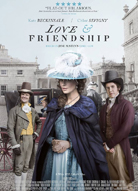By Tim
 Over the course of 21 years and four features, Whit Stillman's dominant themes as a storyteller have remained steady: an affectionate contempt for the economically and intellectually well-off and their aspirations to become even better; and a love of using language as a dueling weapon, with characters using dialogue as a means of asserting superiority and dominance. In both of these respects, we might say that he's always been making Jane Austen movies. For what are Austen's books, if not loving but merciless dissections of the social codes of the upper-middle-class of her own world?
Over the course of 21 years and four features, Whit Stillman's dominant themes as a storyteller have remained steady: an affectionate contempt for the economically and intellectually well-off and their aspirations to become even better; and a love of using language as a dueling weapon, with characters using dialogue as a means of asserting superiority and dominance. In both of these respects, we might say that he's always been making Jane Austen movies. For what are Austen's books, if not loving but merciless dissections of the social codes of the upper-middle-class of her own world?
The marriage of Stillman and Austen was thus as inevitable as it proves to be welcome with Love & Friendship, which nobody could recklessly call "the best" Austen adaptation ever. But it might be the most Austen-esque...
The film is derived from her epistolary novella Lady Susan, which first saw the light of day decades after her death. There's not nearly as much to it as to her more familiar novels, such as Sense and Sensibility or Mansfield Park (which Stillman loosely and unofficially re-worked into his 1990 debut, Metropolitan), which means that the screenwriter's job involved a great deal more invention than is usually the case in Austen adaptations. Luckily for us all, it turns out to be the case that Stillman is fantastic Austen mimic: the cadence of his brittle, cutting, catty dialogue very closely matches her own. The expansive additions he's made to the material have an archaic, classical touch that's too rare in period films, and for that alone I'd be inclined to give Stillman plenty of credit for this achievement.
But then, there's much, much else to love about the Love & Screenplay script. The story, celebrating a selfish, sexually-dominant society woman making life hell for her enemies, was acutely weird by the standards of the 1790s, which is maybe why Austen left it to lie dormant. What it leaves us with in the form of Lady Susan Vernon, is a terrific anti-hero of the Scarlett O'Hara mold: a woman living in a time when women had virtually no social power who sets about taking power for herself anyway, and not-so-secretly earning all of our admiration and affection in the process. It's a magnificent role and brilliantly performed by Kate Beckinsale (who hasn't had such a chance to show off her acting skills and comic timing in many, many years), and watching this objectively terrible, subjectively enthralling human being tear her way across Georgian society with her calculations is a frequently hilarious delight.

That's another one of the film's great strengths: it's outstandingly funny, both thanks to the arch dialogue, and to the cast of eccentrics, buffoons, and the occasional good person who populate Lady Susan's world. The subterranean satire of a Sense and Sensibility or Pride and Prejudice is thrust out in the open here, giving the film a caustic bite we don't usually see in tony literary adaptations. It's hilarious and unforgivingly intelligent, a combination that's always worthy of praise, and immensely pleasurable to watch besides. Of course, comedy and pleasure aren't qualities that tend to rack up awards at this time of year, and though Love & Friendship has picked up a few accolades – the San Diego critics gave it Best Adapted Screenplay, the Chicago critics nominated it for the same, and a good handful of the smaller critics' groups have thrown some love towards it – it would be a distinct surprise to surprise to see the film named in any capacity on Oscar nomination morning. But we can certainly hope: such smart, inventive work as this deserves all the love we can give it, and truly great film comedies are much too precious to let them pass by unrewarded.

Recent FYCs: Jackie's Original Score, Lucas Hedges Supporting Actor, Lily Gladstone Supporting Actress, Moonlight's Original Score, Love & Friendship's Screenplay, The Dressmaker's Costume Design, Jackie's Production Design, Toni Erdmann's Original Screenplay, Denis Villeneuve Director